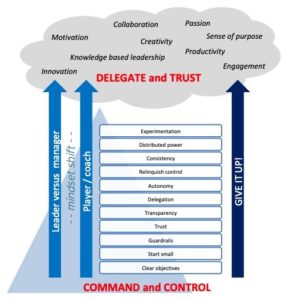Productivity. Increased productivity is a direct result of delegation and trust. Employees not trusted by their manager will be less productive and more likely to leave the organization. Employees who feel trusted are higher performers and go the extra mile to get things done.

When the competition is doing more with less, productivity is critical. Leaders have to give up command and control if they want to increase productivity.
If we impose a process and dictate in a command and control manner, how do those people on whom the process has been imposed, feel about it? Do they own it? Will they try and improve it? Or will they just follow the process in a robotic manner?
If, however, we ask the employees to work out how they can increase productivity and give them some skin in the game, productivity will increase well beyond that achieved through command and control. Employees will own the process, be proud of the process and outcomes, and be continually thinking about how they can improve it further.
Engagement
Micromanaging employees will not result in engagement. Rather the opposite will occur. Disengagement is costly. Employees who are trusted and allowed to self-manage will be engaged. Employees need autonomy and support.
Talent globalisation means that organizations need engaged employees if they are to attract and retain the talent they need in the face of disruption.
In our personal lives, we have the autonomy to use technology as we like, talk to whom we want, access information in the way we want, transact when we want, and the freedom to live how we want. Then in the workplace, we are confined to use only the technology supplied in the way prescribed and talk to people only when they want us to talk to them. We are unable to effectively communicate and collaborate, and, in essence, are suffocated in a command and control hierarchy.
This dichotomy results in employee disengagement. Employees need delegation and trust.
Engagement increases productivity and profitability. It decreases absenteeism and turnover. Losing the best talent can significantly impact productivity and has the financial ramifications of replacing them.
Employee disengagement is not a choice; it is an imperative.
Game score
When we delegate and trust rather than command and control, the benefits are immense. Give it up.
Employees lead through shared knowledge, passion, and a sense of purpose.
It is the nature of the soccer game that when the game is being played, the manager and coach really have little choice but to delegate and trust if the game is to be won.
They cannot command and control from the sideline. The influence of the manager and coach is actually relatively limited during the game. If the manager or coach tries to interfere with play through physical contact with players or officials, they are likely to be subject to a touchline or even a stadium ban.
Winning soccer teams are built on a culture of trust and delegation. Without it, the managers, coaches and players should just pick up the ball, go home, and hang up the boots—for good.
This is the last in the Give it Up series.
In subsequent posts, I will be discussing the role of the adaptive leader and adaptive leadership teams.
Article by channel:
Everything you need to know about Digital Transformation
The best articles, news and events direct to your inbox
Read more articles tagged: Change & Transformation, Featured







